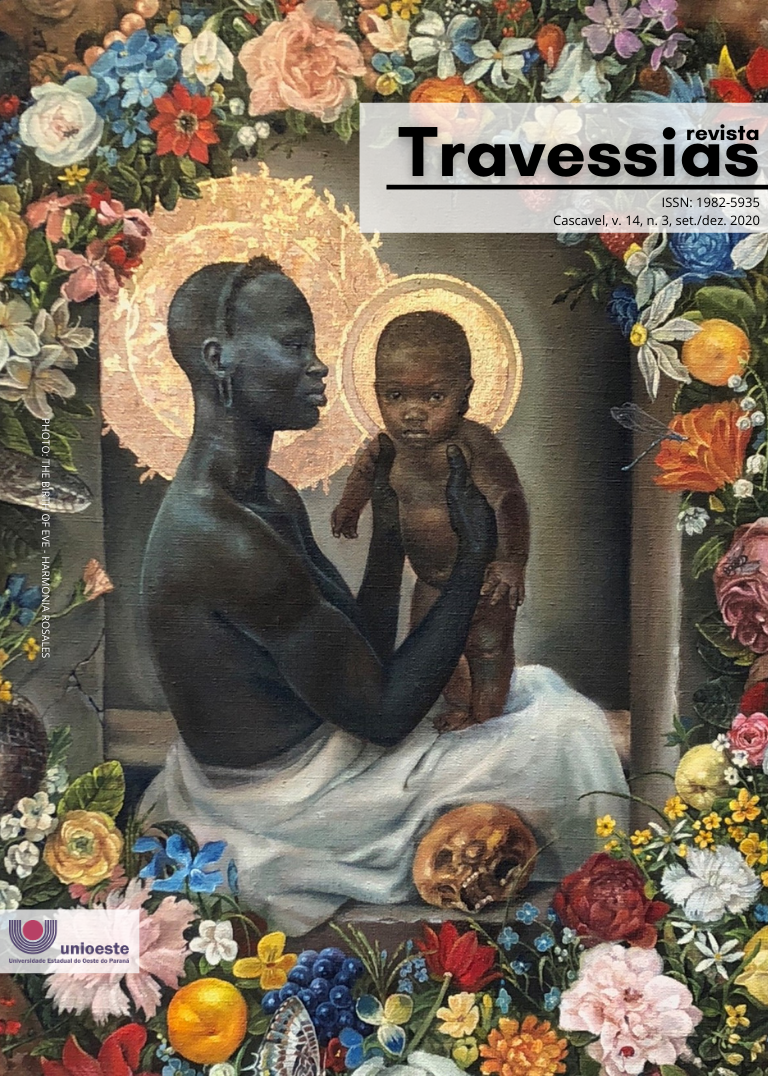Do peso à libertação: duas visões da violência sexual na literatura contemporânea escrita por mulheres
DOI:
https://doi.org/10.48075/rt.v14i3.24902Palavras-chave:
Violência contra a mulher, Autoria feminina, Aline Bei, Stella Florence.Resumo
A lógica binária construída socialmente, além de estereotipar os corpos femininos e masculinos, devendo este ser forte, viril e dominador; e aquele, fraco, submisso e frágil, faz com que, muitas vezes, a violência contra a mulher, abordada de forma simbólica ou física, seja tratada como pertencente à ordem das coisas. A inquietação para esta proposta surgiu após constatação de que o tema da violência contra a mulher, embora persistente a nível epidêmico na sociedade brasileira, não é um tema frequente no âmbito literário contemporâneo. Soma-se a isso o fato de que quando tal tema apareceu na literatura canônica, essencialmente masculina, não raras foram as vezes em que foi tratado de forma estereotipada e naturalizada. Diante disso, nosso objetivo é investigar de que modo o romance contemporâneo de autoria feminina tem articulado visibilidade nas conquistas das mulheres, tendo como foco principal a violência contra a mulher nos romances O peso do pássaro morto (2017), de Aline Bei e Eu me possuo (2016), de Stella Florence. Para isso, será feita uma análise interpretativa e qualitativa da violência sexual nas obras citadas. Para isso, O aporte teórico para se pensar as violências contra a mulher foca-se, principalmente, nos estudos de Heleieth Saffioti (2015) e Carlos Magno Gomes (2014); sobre silenciamentos de Orlandi (1997) e Solnit (2017), além da violência simbólica de Pierre Bourdieu (2014). Conclui-se que a literatura contemporânea escrita por mulheres tem contribuído para a luta contra a violência conta a mulher.
Downloads
Referências
BADINTER, Elisabeth. Um amor conquistado: o mito do amor materno. Rio de Janeiro: Nova Fronteira, 1985
BEI, Aline. O peso do pássaro morto. São Paulo: Editora Nós, 2017
BRETON, David Le. Do silêncio. Trad. Luís M. Couceiro Feio. Lisboa: Instituto Piaget, 1997.
BOURDIEU, Pierre. A dominação masculina: a condição feminina e a violência simbólica. Rio de Janeiro: Bestbolso, 2014
FLORENCE, Stella. Eu me possuo. São Paulo: Panda Books, 2016
FONSECA, Cauê. Projeto Pode Gritar dá voz a vítimas de abuso, transformando desabafos em relatos literários. Gauchazh. Porto Alegre, 03 de maio de 2015. Disponível em: <https://gauchazh.clicrbs.com.br/donna/noticia/2016/05/projeto-pode-gritar-da-voz-a-vitimas-de-abuso-transformando-desabafos-em-relatos-literarios-cjpl6xs3h00bmwscnjdsg985m.html>. Acesso em: 16/02/2020
GOMES, Carlos Magno. Ensino de literatura e cultura: do resgate à violência doméstica. Jundiaí: Paco editorial, 2014
ORLANDI, Eni de Lourdes Puccinelli. As formas do silêncio: no movimento dos sentidos. 4ª edição. São Paulo: UNICAMP, 1997.N. 36 – 2018.2
SAFFIOTI, Heleieth. Gênero, patriarcado, violência.a São Paulo: Expressão popular: Fundação Perseu Abramo, 2015
SONTAG, Susan. A vontade radical: estilos. Trad. João Roberto Martins Filho. São Paulo: Companhia das Letras, 1987.
SOLNIT, Rebecca. A mãe de todas as perguntas: reflexões sobre os novos feminismos. São Paulo: Companhia das Letras, 2017
TOFALINI, Luzia Aparecida Berloffa; AMARAL, Lara Luzia Oliveira. À procura da palavra: silêncio. In.: Revista soletras SOLETRAS – Revista do Programa de Pós-Graduação em Letras e Linguística – PPLIN - Faculdade de Formação de Professores da UERJ Nº 36, p. 195 a 217 (jul./dez. 2018)
Downloads
Publicado
Como Citar
Edição
Seção
Licença
Aviso de Direito Autoral Creative Commons
Política para Periódicos de Acesso Livre
Autores que publicam nesta revista concordam com os seguintes termos:
1. Autores mantêm os direitos autorais e concedem à revista o direito de primeira publicação, com o trabalho simultaneamente licenciado sob a Licença Creative Commons Attribution que permite o compartilhamento do trabalho com reconhecimento da autoria e publicação inicial nesta revista.
2. Autores têm autorização para assumir contratos adicionais separadamente, para distribuição não-exclusiva da versão do trabalho publicada nesta revista (ex.: publicar em repositório institucional ou como capítulo de livro), com reconhecimento de autoria e publicação inicial nesta revista.
3. Autores têm permissão e são estimulados a publicar e distribuir seu trabalho online (ex.: em repositórios institucionais ou na sua página pessoal) a qualquer ponto antes ou durante o processo editorial, já que isso pode gerar alterações produtivas, bem como aumentar o impacto e a citação do trabalho publicado (Veja O Efeito do Acesso Livre).
Licença Creative Commons
Esta obra está licenciada com uma Licença Creative Commons Atribuição-NãoComercial-CompartilhaIgual 4.0 Internacional, o que permite compartilhar, copiar, distribuir, exibir, reproduzir, a totalidade ou partes desde que não tenha objetivo comercial e sejam citados os autores e a fonte.



